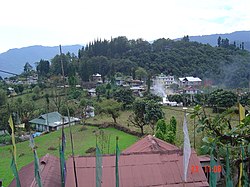Yuksom
Yuksum | |
|---|---|
Historical Town | |
 A beautiful view of Yuksom town in Gyalshing district (Sikkim, India) | |
| Nickname: First Capital of Kingdom of Sikkim | |
| Coordinates: 27°22′24″N 88°13′15″E / 27.37333°N 88.22083°E | |
| Country | |
| State | Sikkim |
| District | Gyalshing |
| Elevation | 1,780 m (5,840 ft) |
| Population (2011) | |
• Total | 4,013 |
| Languages[2][3] | |
| • Official | |
| • Additional official | |
| Time zone | UTC+5:30 (IST) |
| Vehicle registration | SK |
Yuksom is a historical town, just 40 km north of Gyalshing city in the Gyalshing district in the Northeast Indian state of Sikkim. It was the first capital of Kingdom of Sikkim established in 1642 AD by Phuntsog Namgyal who was the first Chogyal (temporal and religious king) of Sikkim. The coronation site of the first monarch of Sikkim is known as the "Throne of Norbugang". Yuksom is where there is the Norbugang Chorten near the Norbugang throne, the place Namgyal was crowned and several monasteries and a lake. The dynastic rule of the Chogyal lasted for 333 years.
The Chogyal established the first monastery at Yuksom in Sikkim known as the Dubdi Monastery in 1701, which is part of Buddhist religious pilgrimage circuit involving the Norbugang Chorten, Pemayangtse Monastery, the Rabdentse ruins, the Sanga Choeling Monastery, the Khecheopalri Lake, and the Tashiding Monastery.[4]
For the Bhutia community of Sikkim, Yuksom has special religious and cultural significance. It has a number of famous Buddhist monasteries and historical monuments as well as ancient Gorkhas small Village. Being at the head of the Khangchendzonga National Park and as the base camp for trekking to Mt. Khangchendzonga, it has large influx of mountaineers from all parts of the world. The village people, as stake holders in biodiversity preservation of the Rathong Chu valley, where the village is situated, have played a significant role in trendsetting and promotion of ecotourism in the area. The inhabitants of this village have most successfully adopted promotion of ecotourism not only in the region but also for other similar areas in Sikkim. Yuksom is thus considered a model village for eco-tourism.[5]
- ^ Yuksom Archived 15 March 2013 at the Wayback Machine
- ^ "1977 Sikkim government gazette" (PDF). sikkim.gov.in. Governor of Sikkim. p. 188. Archived from the original (PDF) on 22 July 2018. Retrieved 28 May 2019.
- ^ "50th Report of the Commissioner for Linguistic Minorities in India" (PDF). 16 July 2014. p. 109. Archived from the original (PDF) on 2 January 2018. Retrieved 28 May 2019.
- ^ Choudhury, Maitreyee (2006). Sikkim: Geographical Perspects. Mittal Publications. pp. 80–81. ISBN 81-8324-158-1. Retrieved 5 May 2010.
- ^ "Carrying Capacity Study of Teesta Basin in Sikkim:The Socio-Cultural and Socio-Economic Study" (PDF). Sikkim Envis: National Informatics Centre. p. 109. Retrieved 7 May 2010.

